Two items have inspired this post: Today is Harry Potter’s birthday, and my daughter was born earlier this month. The first connection should be pretty obvious, but the latter is important because I’ve been reading the series aloud to her (through three books already!)
I will happily discuss these rankings in more detail if anyone is curious. (We actually had a staff-wide ranking of the series in the works back in 2015 that maybe I’ll pull out one of these days.) And I do hope to elaborate a bit more down the line about my feelings toward this series. (Hint hint.)
But the idea here was just to whip out my ranking using minimal justification, which have shifted only slightly in the past five years (and 2.5 re-reads).
Important note: my ranking here is for how much I enjoy these books on re-readings as opposed to other possible metrics, like how much I enjoyed them the first time around or how influential they are. I’m also only counting books that have actually been in print — so the prequel story and the Pottermore Presents ebooks are right out, as are whatever other cash-grab BS has been cranked out recently.
11-9. Fantastic Beasts and Where to Find Them, Quidditch Through the Ages, The Tales of Beetde the Bard
Rowling’s world is an insular, idiosyncratic world that does not stand up to intense scrutiny. It’s best enjoyed peripherally through the adventure rather than through comprehensive lore compendia. These three official supplementary books are at least inoffensive (unlike some of the Pottermore stuff), and at moments interesting (especially Fantastic Beasts), but they are certainly inessential. And I suppose we can add two more to this list this fall.
All of that said… if you want to get me one of those hand-written editions of Beedle the Bard, I’ll happily move it wherever you want on this ranking.
8. Harry Potter and the Cursed Child (Book 8 [?])
I mean, it’s not really a novel, even if it’s been published and marketed as one. I think if you were to experience this book strictly as a play, you’d probably find it a lot more palatable than some of the — er — fans did in book form.
It’s true that Cursed Child (which wasn’t even written by Rowling; she co-created the outline) is an oddity of a book. Many fans have slammed it as fan-fiction-esque due to its inconsistent tone, its heavy leaning on exaggerated character types, its bizarre time travel plot threads.
That said, I really enjoyed reading it, even as I recognized its flaws. Many of its problems are simply its nature as a script, and would probably melt away in a well-produced show. Other aspects, like its hilariously dumb take on time travel and alternate timelines, at least help connect us to the original series.
And, maybe I’m a predisposed sap (see intro paragraph), but I actually loved the theme of fatherhood, and the tenderness and complexity it receives given the limitations of the script medium. As far as minor kudos go, I want to praise it for making the Slytherin house something other than the “evil dudes club” or “probably future members of Trump’s cabinet.”
7. Harry Potter and the Sorcerer’s Stone (Book 1)
There’s no doubt that the first Harry Potter book is a bit lightweight and uneven compared to any of the later books. Sure, if you’re going to rank the significance of books, or praise its inventiveness in a vacuum, you’d mark the debut highly. But compared to the rest of the series, Sorcerer’s Stone is a step down.
A third of the book is just Harry getting to Hogwarts, and the rest is mostly childhood wish fulfillment, not to mention an oddly tone-deaf Dumbledore that’s as whimsical as he is wise. There are obviously some iconic scenes, great dialog, and satisfying moments, but the exciting conclusion is undercut with plot holes and head-scratchers, like why teachers would set up puzzles to protect the Stone instead of, say, putting it in Dumbledore’s pocket; or what Harry actually achieved by meeting Quirrell and Voldy underground. Wouldn’t Dumbledore just have caught Quirrell snooping around the mirror for the stone and cornered The Dark Lord?
6. Harry Potter and the Chamber of Secrets (Book 2)
Though Rowling was still finding her form, she pulled together a much more impressive outing in her sophomore outing. Chamber is darker and richer than Stone, and already gives us some great payoff on foreshadowing from the original, like Hagrid’s redeemed expulsion and Voldemort’s half-blood Dickensian roots similar to Harry’s.
Unfortunately, a bunch of the stuff seems like filler and pointless red herrings; from the curious but pointless Deathday Party to the elaborate Hagrid alibi in the forest as a giant spider, not to mention Dobby causing frustrating nuisances, some of the scenes drag.
But, man, the ending is great. Suspenseful, twisty, and rousing, it makes everything before worth it. Add in some early hints of the series’ disdain for institutions (here in the form of racist bureaucrat Lucius Malfoy), and you have a very satisfying sequel.
5. Harry Potter and the Goblet of Fire (Book 4)
Now an international phenomenon, unburdened by editors, Rowling released a complex but overstuffed tome that thrills but, too often, bores.
On the positive side, you have a cast of characters growing in complexity and depth; Rowling’s many strengths as a storyteller include capturing the growing inner lives of teenage characters. The Triwizard Tournament provides a fantastic structure for the novel, and the extended glimpses we get into the wizarding world outside of Hogwarts adds a lot of color to the series.
On the downside, this book is bloated with too many forgettable characters. In addition to the students and teachers from the two visiting schools, there are all the adults involved with the Quidditch world cup and the Triwizard Tournament. It’s a case of more-is-less.
And while Harry’s climactic encounter with Voldemort, and Cedric’s untimely death, pack a powerful punch, the ultimate twists surrounding Mad-Eye’s Polyjuiced secret identity, and the Goblet as Portkey, are as bewildering as a Confundus charm.
4. Harry Potter and the Deathly Hallows (Book 7)
More even than Goblet, Hallows brings a lot to the table, but also has its share of frustrations. In fact, let’s start with those flaws: The much maligned camping portion does indeed drag, though not quite as much as you’d remember. The end is tethered by three huge lumps of exposition and/or flashback: Snape’s revelation, dream Dubmledore at King’s Cross, and Harry revealing the truth to Voldemort at the Battle of Hogwarts. (I hardly noticed the first time through when I was ravenours for answers; subsequent rereads have made the conclusion feel oddly turgid.)
Other issues emerge beyond the plot structure: The complete absence of Hogwarts prior to the grand finale makes the whole affair feel a bit off and weirdly lonely. The whole Deathly Hallows thread requires some explanation of wandlore that was previously inessential.
So what’s left after all those complaints? A brilliantly crafted tapestry that ties the entire series together with grace and heart and grief and triumph. Dumbledore emerges as an even more compelling character than before, and he was already an all-timer. There are too many exquisite moments to count, and you have to credit Rowling for saving some of her biggest punches for last.
3. Harry Potter and the Half-Blood Prince (Book 6)
The last “normal” Harry Potter book — i.e., the last one built around a school year at Hogwarts with the themes-, mysteries-, and staff member-of-the-year — has some of the absolute best moments of the series. The wonderful thread that explores Tom Riddle’s transformation to Voldemort is truly riveting, and the Horcruxes quest that falls out of the plot raises the series to truly epic fantasy scale.
And that ending… Snape killing Dumbledore is the series’ ultimate climactic moment, and also resulted in one of the Internet’s landmark moments.
Less compulsively readable, but still fascinating, is the series inversion on Harry discovering the truth before everyone else. Where his distrust of Snape and Malfoy had been a previous, recurring red herring, here the tides finally turn as The Boy Who Lived solves the mystery before everyone else. Harry isn’t the little kid who moped because he lost two points for Gryffindor in his first week at Hogwarts anymore.
2. Harry Potter and the Prisoner of Azkaban (Book 3)
My top two selections have flip-flopped a half dozen times in the past few years, but this is what my gut currently says.
Prisoner iterates on the formula of Stone and Chamber of a school year that builds slowly but culminates with fantastic revelations. Yet the net effect is so much more than the first two books. For one, Prisoner brings in some of the series’ greatest characters in Professor Lupin and the titular Sirius Black, who in turn bring out compelling elements in the surrounding characters, Snape and Harry especially.
While other books in the series have great conclusions, none of them hit with the same impact of Prisoner‘s, a master-stroke that reveals the whole book as a tightly-structured build-up, where every previous element had been crucial set-up. The twist, that Black is innocent and Scabbers is Pettigrew, is followed up by a double-whammy twist of reliving the ending and correcting its mistakes. Complain all you want about the absurdity of Hermione owning a time-turner; this is a phenomenally-crafted narrative.
What I admire as much as the plot construction is the thematic tightness. The book’s main theme is the ambiguity of both the past and the future — or, more succinctly, time.
1. Harry Potter and the Order of the Phoenix (Book 5)
Every Harry Potter book has flaws. (Except maybe Azkaban, which is so tightly structured it makes my brain melt.) The major question, then, is how much does the surrounding book overcome those flaws?
Order (or is the one-word nickname Phoenix?) is the epitome of the series’ transcendence. While the book has issues — notably a bloated beginning that’s the primary cause of its astronomical page count and a grating bout of Harry’s teen angst — it more than makes up for it in outstanding content.
Start with the new characters: Luna Lovegood is an instant classic sidekick, and Professor Umbridge is an even better villain. Add on some of the series’ richest themes and subplots: Dumbledore’s Army is my personal pick for the most satisfying thread in Harry’s seven years, and Fred and George wreaking havoc is an ultimate payoff on four books of mischief.
Cap it with one of the series’ most thrilling endings — which includes a kinetic, twisty romp through the Ministry of Magic, a surprising death, and a bombshell-packed denouement — and Order of the Phoenix narrowly edges out Pirsoner of Azkaban as my favorite in the series.



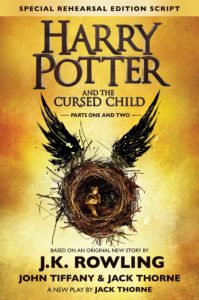
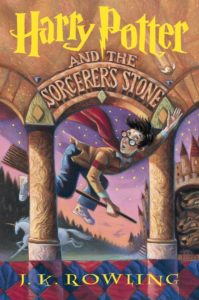
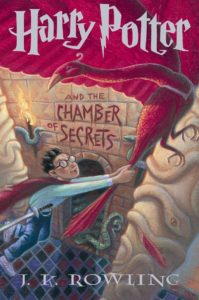

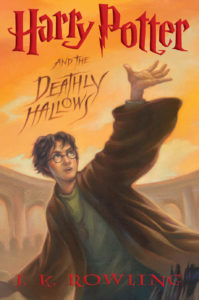
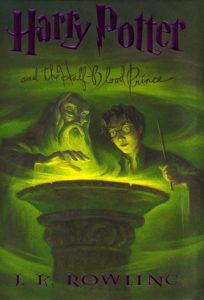
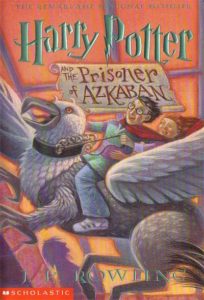
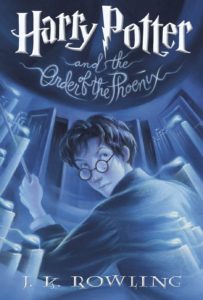



Man, I can’t even find the time to post something when I have no excuses, and you’re out here writing away with a newborn to take care of. I feel suitably ashamed.
Props on having the correct worst 3 books (of the regular 7).
Well, you have my rankings in a Google doc somewhere, so I guess this doesn’t come as a surprise, but my rankings are almost opposite. Chamber is among my favorites, because I feel it does the best job of telling a self-contained story. Half-Blood Prince is probably my number 1, so at least we agree on giving that a high ranking. But OotP? SO BLOATEDLY LONG. And Azkaban? PRE-DESTINATION TIME TRAVEL.
That’s all I have to say about that.
I won’t deny #5 is overlong. I just love a lot of the stuff in it. We’ll see if my affection diminishes when I have to get through all 850 pages reading aloud.
I’ll always go to bat for the time travel in Azkaban though. It’s so cleverly done: The entire ending, you’re built up to think that you’re working with a mutable timeline (i.e. no pre-destination). That makes the moment Harry discovers himself as the caster of the Patronus all the more powerful and surprising. Even if you think the general idea of predestination travel is dumb, it doesn’t prevent you from enjoying the ending, because so many details are constructed to make you think otherwise.
And Chamber has so much throwaway stuff, especially since you know it’s just Dobby being an ass half the time.
I love a good throwdown between Earn This contributors. I feel like we agree too often.
That Folgers jingle is still really good, though.
The post reveals some burning questions and issues which ought to
be discussed and explained. What’s more, it is vital to grasp within the very detail.
From the article, one can easily find something fundamental, unusually for him, something that may be extremely helpful.
So I am thrilled with the data that I have just obtained.
Thanks a lot!
It is always such a joy to read posts created by real professionals.
I am fed up with that no-name, ghostwritten articles.
That is why it was so nice to take a look at a persuasive piece.
I visit the writer has floor knowledge it the subject as well as some practical expertise.
This kind of info is more precious than copypasted blog articles ideas.